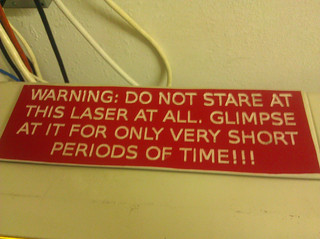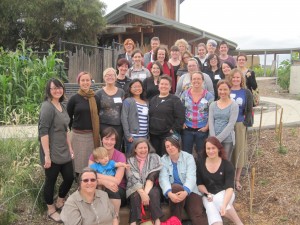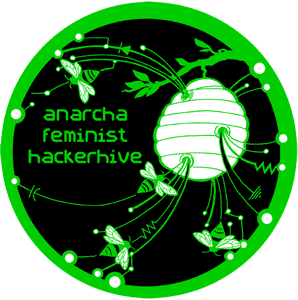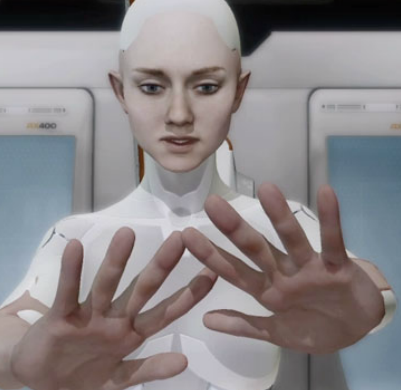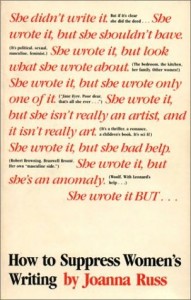At WisCon a couple of weeks ago I was on a panel called Imagining Radical Democracy with Alexis Lothian, L. Timmel Duchamp, and Andrea Hairston. We talked about political change, culture, and science fiction, leaping into mid conversation. Everyone was quite erudite so I will try to link some of the important background concepts, books, and thinkers mentioned. The title and description of the panel don’t quite describe “what we talked about”, but everyone knew what “it” was. This was the topic:
The General Assembly has become a familiar practice since the growth of Occupy Wall Street. Anarchistic and radically democratic organizing processes have a much longer history, though, including the Zapatistas, the Spanish student movement, and movements in the history of feminism. For WisCon members, a familiar feeling might have bubbled up in watching, reading about, or participating in Occupy: wasn’t this a bit like what they did on Le Guin’s Anarres, or in DuChamp’s Free Zones? This panel will discuss the possible growth of a kind of democracy other than our current party-based political systems, using the ways it has been prefigured and imagined in feminist science fiction to help make sense of radical histories and futures.
Here is a rough transcript of the Radical Democracy panel by laceblade. It meant a lot to me personally that laceblade transcribed this panel and put it up for public reading so quickly; it’s something I started doing at WisCon panels to document the conversations for the Feminist SF Wiki, but I was too exhausted to do it this year. It was beautiful not just to see many others documenting live, but to be documented myself by someone so passionate and engaged. I was touched to the core.
I felt that we jumped immediately into the conversation with the assumption that we all knew what we were talking about without having to give much background or try to explain things. We didn’t talk about Occupy or specific movements so much as we talked about “that thing we know when we see it, or are doing it.” We didn’t even really introduce ourselves, partly out of eagerness to jump into the topics, partly from assumption people knew who we were in the context of WisCon 36, and partly because of automatically killing the rock star on the stage (opposite of killing the angel in the house!) — so I’ll write a bit of an intro now!
L. Timmel Duchamp, Timmi, is a publisher who runs Aqueduct Press; a brilliant thinker and SF author of an epic science fiction work in 5 volumes, the Marq’ssan Cycle, which is about an intervention in Earth politics by alien feminist anarchists. They convene a giant consensus meeting including two women from every Earth nation, destroy much of the technological infrastructure of the military industrial complex(es), and establish anarchist Free Zones in many locations around the planet. The book centers on the relationships and complicated conversations of various women including Kay (who is from the Professional class), Elizabeth (an Executive), and Martha (one of the proletariat… a service tech or sub-exec) and female-presenting though ambiguously gendered telepathic aliens such as Sorben and Magyyt. Revolution, imprisonment, torture, being co-opted, complicated sexual relationships across class boundaries, and the exploration of false consciousness and double consciousness all make this series politically exciting and emotionally intense. Her work in establishing a feminist science fiction press has fostered many writers and amazing, award-winning books. During the panel Timmi did what she does so well which is telling a specific story but with the feeling of it being a roundabout way to arrive at a point or an impression or knowledge conveyed which leaves layers of impressions behind — and the feeling I get from her of a mind somewhat frightening in scope and power channeled through the body of a specific fragile human being, exercising her will to focus all the dehumanization she has experienced and witnessed into a scary laser beam. I’m just saying, I feel a disturbance in The Force when she talks.
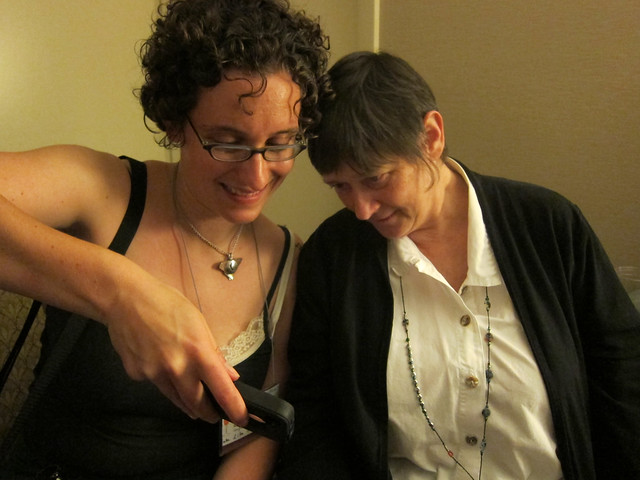
Andrea Hairston is a playwright, professor, and novelist, author of Redwood and Wildfire and Mindscape. She has done a lot of analysis in understanding the history of minstrelry in the U.S. She teaches theater and African American studies at Smith. She’s an amazing speaker and storyteller, brilliant, enthusiastic, and complicated. I love when she talks and gets excited and waves her arms around with the wildest enthusiasm and keenest intellect. And reading Mindscape, I thought (dorkiest example ever) of Menolly describing what it was like to play a piece of complicated music that other people find too difficult and technical (I believe it was The Ballad of Moreta’s Ride) to Master Shonagar; like riding a dragon!
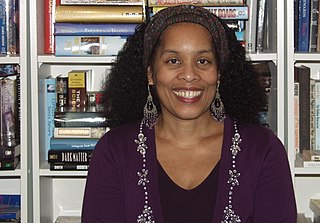
Alexis Lothian is a writer and academic, a professor at Indiana University, and theorist of science fiction fandom. She is an active vidder and deep into media fandom, gender studies, digital cultural politics, and is a founder and editor for the journal Transformative Works and Cultures. She moderated our discussion. I remember on first meeting her I came to a discussion between people of color at WisCon in someone’s hotel room, an intense and amazing conversation which she recorded with permission (I was there as assistant techie person, I think) and transcribed for the inaugural issue of Transformative Works and Cultures, recording with quiet attentiveness, contributing to the opening of that space for conversation.
I felt Laura Quilter’s absence on this panel (and at WisCon) keenly, painfully. She is a huge part of this conversation.
Timmi opened the panel by talking about how her writing and her activism (feminist and anti-globalization work) feed into each other. She talked about why science fiction is important for activism:
Bad experiences create low expectations especially with social rollbacks over the last 30 years. Creates political apathy. Political apathy is a response, not just a state of ignoring the world, it’s a state of actual response. It’s not passive even though it looks like passivity. I think what’s important about science fiction is it gives us alternatives that we can’t imagine in the US even though our history is full of tens of thousands of experiments in collective communities. All around the world, all sorts of things going on, all sorts of collective groups.
“The revolution” takes place in our imagination and is a process, not a means to an end.
Then I talked about hackerspaces and Noisebridge, the hacker/maker anarchist collective I’m part of in San Francisco. Hackerspaces are an important part of what’s happening in the current political moment. People banding together to try to form alternative social structures, pool resources, make physical spaces that reflect some of the social, cultural spaces and philosophies we have made in F/LOSS culture and on the Internet and web. As part of Riot Grrrl we tried to “Kill Rock Stars”; make and be part of a story that is not about a Great Man, not about The Hero, that works from many points of view; there is no puppet master moving us around a chessboard, and there are no saints (or sainted texts) we should canonize. Difficult SF stories, difficult narratives, are important politically to teach us all how to read reality, how to construct complicated truths. I described trying to explain “Anonymous” or “Occupy” to journalists, and how because of their failure of imagination, and their assumption that no mainstream readers could understand a story without a hero, they can’t get it. They have to participate and be changed in order to know how to tell a story that draws in the reader to participate and change.
I’m not sure how long it took me to say all that, but in my remembrance of the panel I managed it in a leaping, telegraphic, holographic staccato. I felt transported by not just my words but by knowing that we were all on the same page, many of us, and that what we were about to say would blend together like a river and take us somewhere.
Andrea said her upbringing was of a very solid African American household of being a race man, or race woman. Something which happily did not need to be explained in a feminist anti-racist science fiction con, but which I will link for you here. Andrea talked about the Iqbo Women’s War, not just the “riots” and murder by the British in a particular incident but women’s war as part of Igbo culture and politics.
. . . {the] one who tells the story rules the world. Therefore, we all need to. WE all need to be agents of action, all need to be storytellers. All need to be agents of action in the story.
For Andrea the story of Women’s War is one of working feminist anarchy, of a political process that worked, of anarchy rooted in a specific place and time and culture, that came from African women and men and worked for them; an important story. Part of that story is the British shot everyone and made the Iqbo have chiefs. Back to the idea of “no rock stars”, no leaders in the sense of elected officials who represent everyone in a hierarchical structure that feeds into the hoppers of power and that support oppressive (and in this case imperial, patriarchal) infrastructures. The book Andrea is currently writing is about a woman coming to America from that time and place.
Andrea then remembered to introduce and identify herself. So I introduced myself too and said everyone should buy my book, Unruly Islands. Andrea’s two novels are published by Aqueduct Press. My book as well, and Alexis and I both edited volumes of The WisCon Chronicles, which is a series Aqueduct publishes to document the conversations at WisCon every year. Aqueduct Press for me has solidified, made real, some of the exciting public discourse that happens at WisCon, the connections that spark our thought, the utopian ideals we share, the passion that fuels our daily practice of life and activism and writing. It made our conversations more public, and I hope adds another small brick to the things we are building, the ways we are trying desperately not to lose our histories as women, as marginalized people who are aware of the processes that shape how the stories are told and what is allowed to be seen as “real”. When I first realized what Timmi was trying to do by starting Aqueduct I was happy beyond explanation. Something that was my dream was happening in the world — for real. Cultural artifacts created and fostered, nurtured, grown. Timmi is my hero for doing this, for committing her life work to this act, for making our communities visible to each other and to others, for exposing us further as public intellectuals. I am so honored to be part of it and that they publish my work. Long ago I realized that what I wanted in life was not fame, money, success, the Good Life, in the way people sometimes describe what goals should be, but instead the respect of other people I respect. It was like a little mantra for me. Whenever it became reality in a small way, I felt bolstered and comforted: a sign I was on the right track. I rather imagined (as a teenager, in my childlike hero worship) that as an embarrassingly specific little scenario: that I’d be at a cocktail party with Marge Piercy, and she’d know my work, and we’d talk about our ideals, books, feminism, and poetics as equals in the creative process even if not equals in worldly position or age. WisCon and Aqueduct have made that dream come true for me even if I have not yet achieved the particular Nirvana of wine and cheese with Marge. I admire so many people there — very deeply. Beyond the Secret Feminist Cabal, which was a joke made real in organic “slow anarchy” fashion, and which continues to spread, which describes something that (like Riot Grrrl, like Anonymous) does not exist, and which you joined by hearing the idea and declaring you were in it, too — it came true for me. I wish that dream will come true for everyone. The respect of other people you respect.
Back to the panel. Alexis asked us all three to give specific examples of “what we were talking about” — of collectivity, of collective action and what happens and how.
In response, I talked about Noisebridge some more. (Which… ironically… is light years away from feminist utopia for me as a woman.) I talked about hackerspaces.org, the history of hackerspaces, the idea of F/LOSS culture not just “products” but culture, and cultural production, and community; the ideas of patterns and anti-patterns, in software, in architecture and culture, from the book A Pattern Language which by the way is a fascinating read and which I used to explain Joanna Russ’s How to Suppress Women’s Writing to F/LOSS geeks. (A later WisCon panel on Feminism and F/LOSS brought this in as well.)
Alexis interrupted me to remind me that I wrote about this very topic in the latest WisCon Chronicles, Volume 6, Futures of Feminism and Fandom, which she edited. “Oh yeah! Right! Read that essay, and you will understand what I mean!” I moved on to answer Alexis’ question, explaining what Noisebridge is and how it works — and some of its glories and problems.
Alexis mentioned Louisa May Alcott and Fruitlands. I then brought in, as another strand to the pattern, Alice Marwick’s and danah boyd’s excellent paper on gender and Internet drama The Drama! Teen Conflict, Gossip, and Bullying in Networked Publics as well as my own essay with Debbie Notkin on Internet Drama from The WisCon Chronicles, Volume 3, Carnival of Feminist SF. To understand the dynamics of women and public discourse, read that paper about teenagers’ attitudes toward “drama”.
Andrea says “drama” is melodrama. Alexis adds that it is “wank”. Yes! I then said,
By making a space in which we’re trying to address one problem, we’re more revolutionary than we realized. Once you’re part of a revolution, you have to Fix All the Things. It’s very hard, very valuable it takes place in public, documenting what happens. Also really difficult and uncomfortable
Alexis added,
What wank and drama and melodrama do and why they might just not be….part of how we negotiate. We have to emerge from it. It does things that other kinds of more carefully planned politics don’t do. Even the most trivial fights can have ripples of effects that are really important to what a community does.
And Timmi pulled it together by saying,
Little drops of water evaporate in dry atmosphere, need a human environment. Not just all of internal difficulties here but thes efforts are operating in a context in which we have vast problems. We have terrible collective problems and no collective solutions or collective process. These space (occupy, hacker, etc.) are besieged by that context. They can’t address them by themselves. That’s basically the problem. We sort of, what’s happening is more and more people are seeing the horizon of what’s possible but in this current environment, it’s very hard to …you can hack out a space but you can’t put up walls, [it’s] antithetical to what you want to do.
She then talked about being arrested for direct action against globalization, and the trial process. I got kind of excited listening to this and started writing a poem about it in my paper notebook while also live-Twittering.
A lesson from that story is that the interface between what we’re building, what we’re doing, as anarchists, feminists, activists — the interface between that and the larger world is extremely important and uncomfortable.
Alexis brought us back to talking about culture, narrative, and cultural production. Writing, drama, process, and art.
Andrea then kicked into awesome overdrive.
I love live theater, I don’t know what’s going to happen, even if you have a script. I know my blocking, audience comes in, audience makes me change. Every moment is alive. Feedback between me and the audience and other actors. Have to respond. All theater is to prepare you to be ready in the moment. That’s what anarchy is about. If you just follow blocking and your lines, that’s not going to work. What am I going to do that keeps me…the audience loves it when you solve the problem, in it for the live moment. Image of anarchy as negative melodrama. Good guys/bad guys. Victor Turner: Social drama is essential to humanity. I’m paraphrasing him. Have to have dramatic process in order to perform the meaning that you want. That’s what drama is. Struggle to have lived experience turn into meaning. That is a slow process. We’re stuck on things needing to be fast. Social drama takes time. Slow money, slow food, I think we need to have slow anarchy.
For Andrea, it is about creating ecosystems. There are people who build monuments, and people who build ecosystems. That is true in writing science fiction as well.
I spouted off at length trying to cram in more holographic imprint of what I mean and what I see and know. My process of watching many channels at once for the Arab Spring and Occupy Oakland. Learning to listen and hear decentralized narratives, which are not what you think you want to hear. Book recs: Constellation Games by Leonard Richardson (with caveats); Direct Action by David Graeber; Illicit Passages by Alice Nunn. Marq’ssan Cycle; Kevin Carson. My currently developing theory that a particular current of SF today is not post-apocalypse but is Mid-Apocalypse; not first contact with aliens, not pioneering imperialist expansion, but being inside the process; the 1% are our aliens, already here, alien because we can’t imagine or access their scale of power; this is important in what science fiction is going to become.
We had some audience responses then.
Andrea Hairston talked about capitalism and the idea of “growth”. Opposed to the ecosystem of growth, diversity.
I agree with Andrea and add that it is part of the current of science fiction I’m attempting to describe, which is about deepening interconnectedness — not about first contact or “discovering new frontiers” or invasions.
Timmi talked about journalism and false objectivity.
Andrea talked at length about lland ownership, property, the degradation of the commons which is a big part of our struggle. She brought in accessibility and specifically WisCon’s and other feminist space’s struggles to be accessible, which is part of treating the commons as the commons, as being for everyone; changing cultural attitudes toward the air and smoking, for example. I felt transported all over again to a higher level of thought hearing her bring in so many strands to our central topic — and one that touches on my experience so personally as disability and access and public space.
I put in one more book rec I had forgotten in my earlier burst of book recs that do or represent “what it is we are talking about”. Tales from the Freedom Plough, edited by 6 women, stories told by 52 different women who worked in the Civil Rights movement. Individual stories, sometimes contradicting each other, brought together to represent what happened, what is history, what is truth, and thus what is possible for us to do, like a beautiful and terrifying map. I meant to bring in Always Coming Home by Ursula K. Le Guin, as another exemplar; but we were wrapping up the panel.
Timmi closed the panel wonderfully by quoting Augustine of Hippo:
Hope has two beautiful daughters, their names are Anger and Courage. Anger that things are the way they are, and Courage to make them the way they ought to be.



